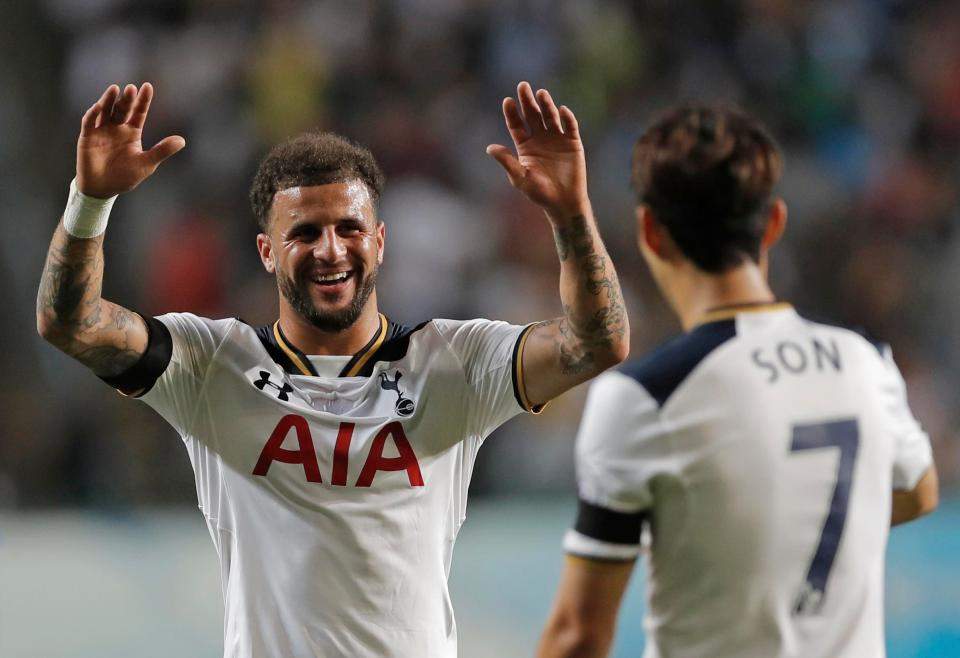London – Kyle Walker for £50m. £50m for Kyle Walker. There is no way of saying it that does not sound a bit, well, odd.
That is not to do down Walker, who was probably the best right-back in the Premier League last season. But still: £50m for Kyle Walker.
In part it is to do with the changing role of the full-back. Gianluca Vialli used to say the right-back was invariably the worst player in a team, the one left over when the good defenders had been moved into the center and the technically gifted players had been moved into midfield. Left-backs, being left-footed and therefore having a scarcity value, were somehow a different case, something exemplified in the way the first three great attacking full-backs were left-sided: Nilton Santos, Giacinto Facchetti and Silvio Marzolini.
That is not true any more. The full-back, even in a back four, has become an attacking presence and that means he must have not merely pace, stamina and defensive qualities, but also the ability to beat a man and deliver a cross.
Walker can do all of that – even if there are some at Spurs who feel Kieran Trippier, who averaged 50 percent more accurate crosses per game last season than Walker, is the better deliverer of a ball. Having missed out on Dani Alves, a high-class, low-cost option, Walker is an understandable alternative for City; he has not won as much and he, to put it bluntly, is not as good a footballer, but he has Premier League experience. Whether he has the technical qualities to operate in that tucked-in, defensive midfield role Pep Guardiola often demands from his full-backs is debatable, which perhaps signals that City will return to a more orthodox understanding of the full-back role, but Walker will clearly be an asset to the squad.
But that does not address the central point, which is that he cost £50m, with potentially more to come in add-ons. Perhaps that is what the market demands but the market increasingly seems to be going crazy. Walker is only the latest of a series if extraordinary deals this summer: Romelu Lukaku for £75m, Alexandre Lacazette for £53m, Mohamed Salah for £37m, Jordan Pickford for £30m. It’s usually a cheap dig at football to point out how many hospitals or schools could be funded for a player’s weekly wage but, really, how are historians of the future going to explain a society that has dragged itself on under austerity for seven years and yet smiles benignly at a decent right-back going for £50m?
Even within football’s gilded bubble this is a deal that stands out. Walker is 27. He has only ever scored five goals (now, perhaps this is a sign that football has at last realized that goals are not the be all and end all of a player’s worth, but the point is that Walker is not merely far from being Lionel Messi or Cristiano Ronaldo, he is not even Stuart Pearce or Steve Nicol). He has won only 27 England caps (he may be the clear first-choice right-back now but a year ago no one would have been overly concerned if Roy Hodgson had preferred Nathaniel Clyne). And yet now he is the most expensive defender in history.
It feels as though a collective madness has gripped the Premier League, which now has the most expensive back five in history: Walker, John Stones, David Luiz, Eliaquim Mangala and Luke Shaw. In part it’s a result of the latest broadcast deal, which means that every one of the 20 Premier League clubs ranks in Forbes’s top 30 clubs in terms of annual revenue. And in part it’s because to the sheikhs, oligarchs and hedge fund grandees who own Premier League clubs, £50m is not actually that much money. The old scale, whereby a club’s wealth was in direct correlation to gate receipts and therefore had some grounding in the everyday world of fans, simply does not apply any more.
In the early 17th century, the trade in tulip bulbs in the Netherlands reached unprecedented levels, particularly after the infection of some plants with the mosaic virus led to an exotic streaked effect on the petals. For years, despite warnings from guilds and the church, prices went up and up, seemingly without end until, abruptly, one day in February 1637, perhaps because of an outbreak of bubonic plague, buyers did not show up at a market in Haarlem. The bubble burst, the outrageous sums bulbs fetched suddenly seemed nonsensical and hundreds of investors were ruined overnight.
There is a danger always in being scandalized by transfer fees. Some of the reactions to Middlesbrough breaking the £1,000 barrier to sign Alf Common from Sunderland in 1905 look laughable now. The football boom has outlasted the financial crisis. Perhaps the sport’s internal economy is robust and these fees do make sense. Perhaps the Haarlem moment will never come. But on the other hand, Manchester City have just signed Kyle Walker for £50m.
The Guardian Sport
